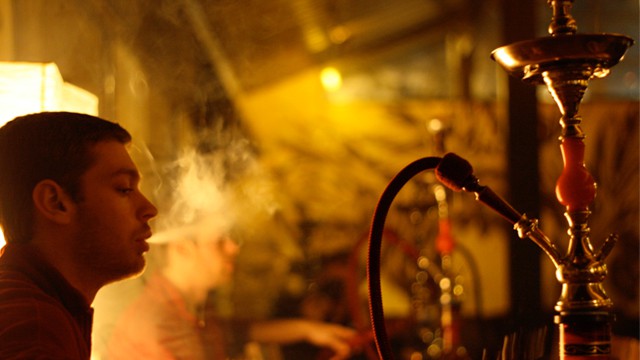Could a Hookah Ban Hit Mississauga?
Published November 9, 2015 at 8:53 pm

After much debate, Toronto city council voted 34-3 to halt any hookah smoking (even if the product does not contain tobacco) at licensed establishments in the city.
The decision, which was not a close one by any means, came after months of discussion. While there’s a persistent belief that the water in a hookah or shisha pipe filters out dangerous toxins and makes hookahs significantly less dangerous than cigarettes, health authorities are not convinced.
According the National Post, medical officer David McKeown told council back in the spring that “People who smoke (hookahs) regularly experience the same kinds of health effects that people that smoke tobacco cigarettes experience.”
What effects are those?
“There’s the belief that toxins are filtered out through the water in the water pipe, which is not the case. Cardiovascular disease, respiratory disease and cancer are all associated with long-time use of hookahs,” the Post reports.
It appears the decision was made to both protect public health and avoid sending mixed messages to young people regarding smoking in general. In a way, it makes sense. Many moons ago, bar and restaurant owners wrung their hands about the devastating effects smoking bans were going to have on their businesses. While smokers certainly mourned the languorously drawn out loss of smoking sections and patios, bars and restaurants — and their coveted outdoor spaces — are still thriving.
If smoking is smoking and we’ve decided, as a society, that smoking should be confined to private or open-air areas and kept out of indoor spaces, the hookah ban is a logical extension of that — to be fair, incredibly successful — philosophy.
But the hookah is slightly unique in that the practice of smoking is a unique cultural activity. For many, the hookah bar is a taste of home. This is especially true in Mississauga, where a ban could be proposed at any time.
We reached out to the city regarding the possibility of a ban and were told that Mayor Bonnie Crombie just released a statement that said:
“I take this issue very seriously and requested that Peel Regional Council thoroughly look at the public health impacts of hookah in our neighbourhoods. Peel Council will further debate this matter on Thursday. We are committed to doing our part to keep our residents healthy and out of harm’s way.”
In the Post article, restaurateur Younes Regragui, owner of the Desert Rose Restaurant in Toronto, says that he sees cultural discrimination in the debate.
He told the Post, “I would absolutely call it (discrimination). In the Middle Eastern community, (the hookah) has been embedded in our culture for centuries. If you sit in a family gathering and if you go to Middle Eastern countries, you’ll find it all over the place. I’m against serving hookah to teenagers 200 per cent. We need to (create) some laws about it instead of hurting small business owners like myself. You’re taking away our dream.”
Mississauga is home to several hookah bars and we broke down the best ones here.
For so many people, they’re a destination establishment. If a hookah ban proposal were to make its way to council, how would the restos cope? Probably by re-branding themselves as traditional Middle Eastern joints that are all about food, family and socializing — kind of like a typical shawarma or kebab resto.
Still, the challenge a ban would pose would be formidable. While most bars and restaurants adapted to smoking bans, they weren’t known for smoking — they were, first and foremost, food and beverage hotspots. While most hookah places offer full menus, they’re typically frequented for that fruity, smoky taste of home they — and they alone — offer.
People could also ask why, if we ban smoking in restaurants because of detrimental health effects, we don’t extend those restrictions to alcohol.
That’s a question Toronto Mayor John Tory himself couldn’t answer (and at least he was honest about not having an answer).
“The debate about what people are smoking is, in a way, academic,” Tory told the Star. “But if you said to me there is somewhat of an inconsistency between trying to stop smoking in licensed places altogether, or places that have businesses, and not stop drinking, yes there is. If you asked me to explain that, I’m not sure I could.”
It really comes down to values. Alcohol bans — which were society-wide and not restricted to licensed businesses — were terribly unsuccessful and have, as a matter of course, been abandoned (and for good reason). Smoking bans (chiefly restricted to public facilities) have been quite successful and easy enough to adapt to. People who want to smoke still can, they just have to do it at home or outside.
Hookah kind of falls somewhere in between. It’s not as ubiquitous as alcohol or as divorced from social and cultural norms as cigarette smoking. Unless the Middle Eastern community (and hookah enthusiasts in general) start to treat hookah/shisha and like cigs or cigars, it’s hard for people not to feel like something special and socially important is being taken away, especially when other avenues — age restrictions, separate spaces, specially-regulated places — aren’t being adequately explored.
As of now, you can still pair a hookah session with some hummus at Haze Lounge. But the bans — already enforced in Alberta, Nova Scotia, Vancouver, Peterborough and Barrie — are looming and Sauga has a lot of restos that depend on the practice staying legal.
It’s a tough one.
What do you think? Is all smoking created equal and deserving of equal treatment under the law? Is it hypocritical to restrict hookahs but not booze? Are there special cultural considerations that need to be taken into account here?
Have you say in the comments.

Would you like to see Hookha banned in Mississauga?
[[nid:6381]]









